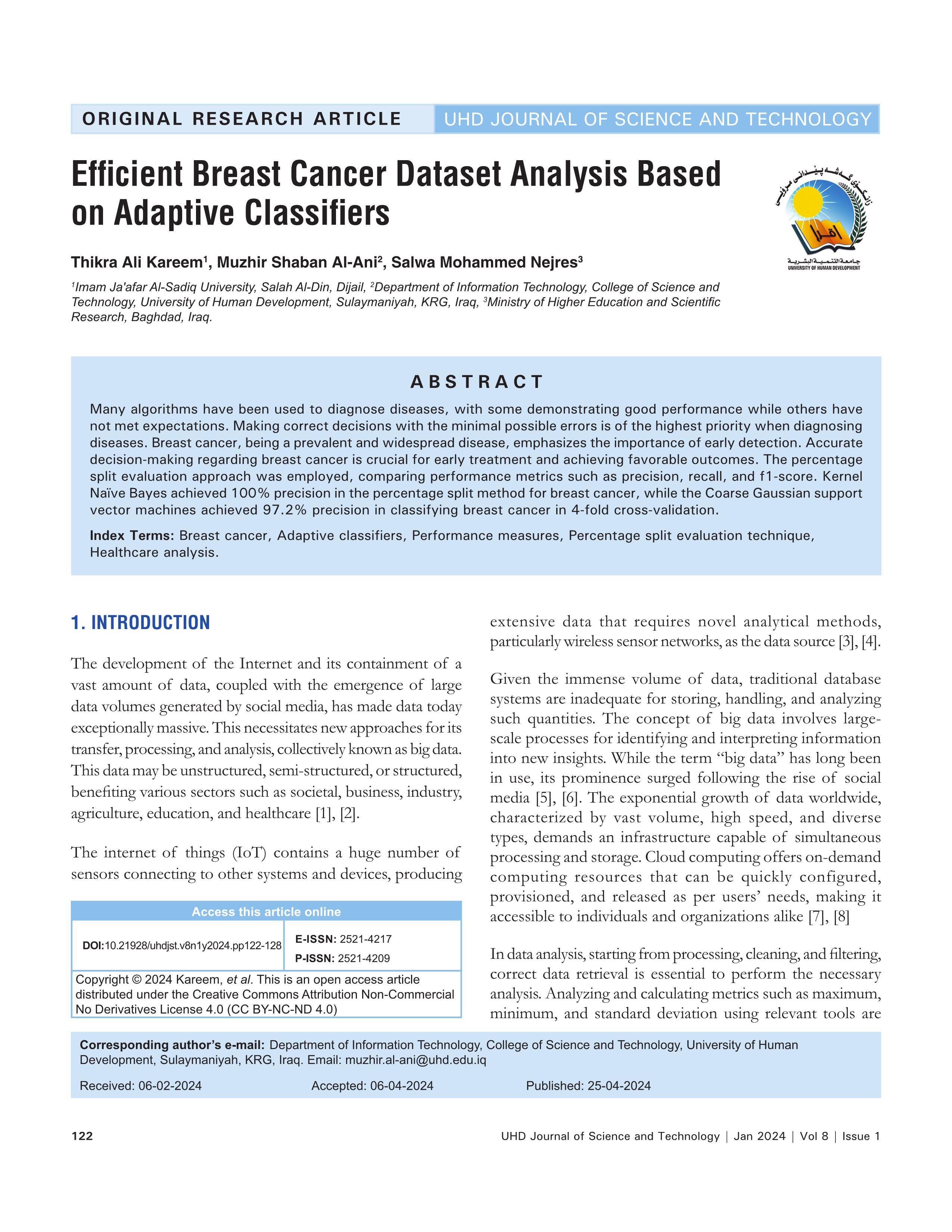Efficient Breast Cancer Dataset Analysis Based on Adaptive Classifiers
DOI:
https://doi.org/10.21928/uhdjst.v8n1y2024.pp122-128Keywords:
Breast Cancer, Adaptive Classifiers, Performance measures, Percentage split evaluation technique, Healthcare analysisAbstract
Many algorithms have been used to diagnose diseases, with some demonstrating good performance while others have not met expectations. Making correct decisions with the minimal possible errors is of the highest priority when diagnosing diseases. Breast cancer, being a prevalent and widespread disease, emphasizes the importance of early detection. Accurate decision-making regarding breast cancer is crucial for early treatment and achieving favorable outcomes. The percentage split evaluation approach was employed, comparing performance metrics such as precision, recall, and f1-score. Kernel Naïve Bayes achieved 100% precision in the percentage split method for breast cancer, while the Coarse Gaussian support vector machines achieved 97.2% precision in classifying breast cancer in 4-fold cross-validation.
References
P. Raj, T. Poongodi, B. Balusamy and N. Khari. “The Internet of Things and Big Data Analytics Integrated Platform and Industry Use Cases”.1st ed. Routledge, United Kingdom, 2020.
L. Wang and R. Jones. “Big data analytics in cyber security: Network traffic and attacks”. Journal of Computer Information Systems, vol. 61, pp. 1-8, 2020.
Z. A. Dagdeviren and O. Dagdeviren. “BICOT: Big data aanlysis approaches for clustering cloud based IOT systems”. European Journal of Science and Technology, vol. Special Issue 26, pp. 395- 400, 2021.
K. Ding and P. Jiang. “RFID-based production data analysis in an IoT-enabled smart Job-shop”. IEEE/CAA Journal of Automatica Sinica, vol. 5, no.1, pp. 128-138, 2018.
S. Sawalha and G. Al-Naymat. “Towards an efficient big data management schema for IoT”. Journal of King Saud University- Computer and Information Science, vol. 34, pp. 7803-7818, 2021.
N. Arhab, M. Oussalah and M. S. Jahan. “Social media analysis of car parking behavior using similarity based clustering”. Journal of Big Data, vol. 9, p. 74, 2022.
R. Sharma, D. K. Sharma, D. Bhatt and B. Thai Pham. “Big Data Analysis for Green Computing Concepts and Applications”. 1st ed. Routledge, United Kingdom, 2022.
H. Nasiri, S. Nasehi and M. Goudarzi. “Evaluation of distribute stream processing framework for IOT applications in smart cities”. Journal of Big Data, vol. 6, p. 52, 2019.
F. Ullah, H. Naeem, S. Jabbar, S. Khalid, M. A. Latif, F. Al-Turjman and L. Mostarda. “Cyber security threats detection in internet of things using deep learning approach”. IEEE Access, vol. 7, pp. 124379-124389, 2019.
A. K. Sangaiah, A. Thangavaelu and V. M. Sundaram. “Cognitive Computing for Big Data Systems Over IoT Frameworks, Tools and Applications. Springer, Berlin, 2018.
X. Nie, T. Fan, B. Wang, Z. Li, A. Shankar and A. Manickam. “Big data analytics and IoT in operation safety management in under water management”. Computer Communications, vol. 154, pp. 188-196, 2020.
A. Akbar, G. Kousiouris, H. Pervaiz, J. Sancho, P. Ta-Shma and F. C. K. Moessner. “Real-time probabilistic data fusion for large-scale IoT application”. IEEE Access, vol. 6, pp. 10015-10027, 2018.
D. Serpanos and M. Wolf. “Internet-of-Things (IoT) Systems Architectures, Algorithms, Methodologies”. Springer, Berlin, 2018.
S. A. Shah, D. Z. Seker, S. Hameed and D. Draheim. “The rising role of big data analytics and IoT in disaster management: Recent advances, taxonomy and prospects”. IEEE Access, vol. 7, p. 54595-54614, 2019.
M. Babar, M. D. Alshehri, M. U. Tariq, F. Ullah, A. Khan, M. Irfan Uddin and A. S. Almasoud. “Energy-harvesting based on internet of things and big data analytics for smart health monitoring”. Sustainable Computing: Informatics and Systems, vol. 20, pp. 155-164, 2018.
S. Singh and A. Yassine. “IoT big data analytics with fog computing for household energy management in smart grids”. Smart Grid and Internet of Things. Springer, Berlin, pp. 13-22, 2018.
S. A. Shah, D. Z. Seker, M. M. Rathore, S. Hameed, S. B. Yahia and D. Draheim. “Towards disaster resilient smart cities: Can internet of things and big data analytics be the game changers? IEEE Access, vol. 2, p. 1-19, 2019.
L. Syed, S. Jabeen, S. Manimala and A. Alsaeedi. “Smart health framework for ambiet assisted living using IoMT and big data analytics techniques”. Future Generation Computer System, vol. 101, pp. 136-151, 2019.
C. Li. “Information processing in Internet of Things using big data analytics”. Computer Communications, vol. 160, pp. 718-729, 2020.
M. S. Hadi, A. Q. Lawey, T. E. El-Gorashi and J. M. Elmirghani. “Patient-centric HetNets powered by machine learning and big data analytics for 6G networks”. IEEE Access, vol. 8, pp. 85639- 85655, 2020.
C. Ge, C. Yin, Z. Liu, L. Fang, J. Zhu and H. Ling. “A privacy preserve big data analysis system for wearable wireless sensor network”. Computers and Security, vol. 96, p. 101887, 2020.
Z. Lv, L. Qiao, K. Cai and Q. Wang. “Big data analysis technology for electric vehicle networks in smart cities”. IEEE Transactions on Intelligent Transportation Systems, vol. 22, pp. 1807-1816, J 2020.
S. M. Kaya, A. Erdem and A. Güneş. “A smart data pre-processing approach to effective management of big health data in IoT edge”. Smart Homecare Technology and TeleHealth, vol. 8, pp. 9-21, 2021.
I. Ahmed, M. Ahmad, G. Jeon and F. Piccialli. “A framework for pandemic prediction using big data analysis”. Big Data Research, vol. 25, p. 100190, 2021.
T. Qin, P. Poovendran and S. BalaMurugan. “Student-centered learning environments based on multimedia bi data analytics”. Arabian Journal for Science and Engineering, vol. 48, p. 1-11, 2021.

Downloads
Published
How to Cite
Issue
Section
License
Copyright (c) 2024 Muzhir Shaban Al-Ani, Thikra Ali Kareem, Salwa Mohammed Nejres

This work is licensed under a Creative Commons Attribution-NonCommercial-NoDerivatives 4.0 International License.


